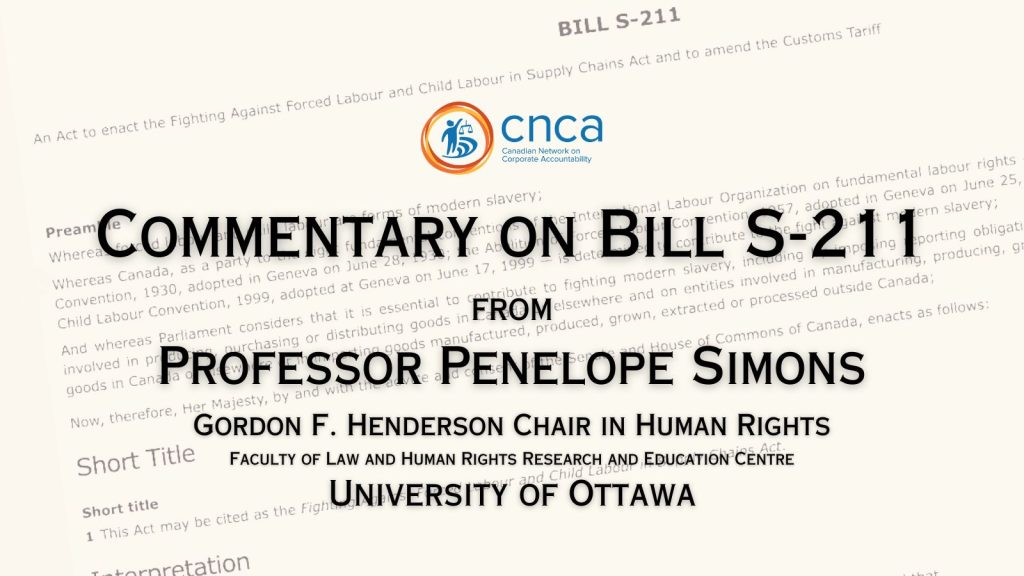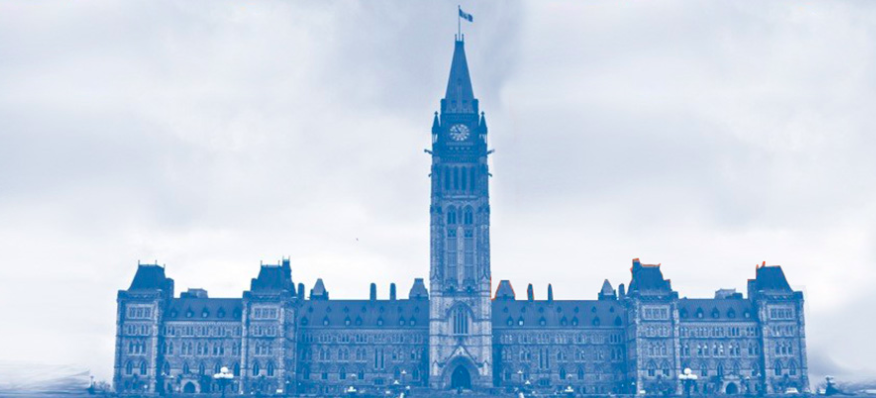The Honourable John Mackay has stated that Bill S-211, An Act to enact the Fighting Against Forced Labour and Child Labour in Supply Chains Act and to amend the Customs Tariff, will require a company annually “to examine its supply chain and satisfy itself that there is no slavery in the supply chain… and a CEO will have to sign a statement to that effect with the same impact that it would if you signed a false statement for an accountant.” [1]
However, that statement is inaccurate and mischaracterizes the obligation on companies.
Under the bill, there is no requirement to examine the supply chain and to ensure there is no forced labour. There is no statement “to that effect” that the CEO will have to sign. The CEO only needs to disclose any steps taken or processes in place to address or remediate forced labour in the supply chain. While companies can be fined for providing misleading or false information, the information they are required to provide is not whether there is forced or child labour in the supply chain. The information they must provide is simply about policies in place and steps, if any, the company has taken to reduce the risk of forced labour.
Under this legislation, companies are merely required to report annually “on the steps [they have] taken during [the] previous financial year to prevent and reduce the risk that forced labour or child labour is used at any step of the production of goods in Canada or elsewhere”. The report must include, among other things, “the company’s policies and due diligence processes” and “any measures taken to remediate any forced labour or child labour” [2] and it must be made public. [3]
If a company has no policies on forced or child labour and/or has taken no such steps, it will only need to report that fact. It is only if a company fails to report, to make the report public, or if it provides false or misleading information that it can incur a fine of up to $250,000. [4]
The prescriptions of this Bill do not meet Canada’s obligations to protect human rights, nor do they meet the UN Guiding Principles on Business and Human Rights. [5] This bill is modeled on the UK and Australian modern slavery reporting legislation. The hope behind this type of legislation is that the act of reporting will incentivize companies (and their managers) to take action to address the risks of forced labour and child labour in their supply chains.
Recent studies have demonstrated that such legislation has failed to meet this goal. The Business and Human Rights Resource Centre study of corporate compliance with the UK Modern Slavery Act, assessed 16,000 corporate reports over five years. The BHRRC noted that while transparency is important, it is “insufficient to prevent even the worst forms of labour abuse”, 6 and it concluded that the legislation had “failed in its stated intentions”. [7]
Similarly, a study by the Human Rights Law Centre and others examined 102 reports made under the Australian Modern Slavery Act 2018 by companies in the garment, healthcare, horticulture and seafood sectors that have “known risks of modern slavery”. 8 The study found that 1) the majority of companies engaged in superficial reporting, failing to address the mandatory reporting criteria; over half of “the companies reviewed (52%) [were] failing to identify and disclose salient sectoral risks in their operations and supply chains”; and 3) less than 30% of the companies whose reports were reviewed “could demonstrate that they [were] taking some form of action against modern slavery risks that [would lift] supplier working conditions or [tackle] root causes”. [9]
Penelope Simons
Professor and Gordon F. Henderson Chair in Human Rights, Faculty of Law and Human Rights Research and Education Centre, University of Ottawa
===
ENDNOTES
- Standing Committee on International Trade study: “Environmental and human rights considerations regarding
Canadian mining firms abroad”, free transcript from video of February 9th, 2023 hearing, available at
https://www.ourcommons.ca/Committees/en/CIIT/StudyActivity?studyActivityId=11910674, at 16:47. - Bill S-211, An Act to enact the Fighting Against Forced Labour and Child Labour in Supply Chains Act and to
amend the Customs Tariff, s. 11. - Ibid, s. 13.
- Ibid, s. 19.
- UN Doc. A/HRC/17/31 (2011), Guiding Principles 17-21.
- Business and Human Rights Resource Centre, “Modern Slavery Act: Five Years of Reporting – Conclusions from
Monitoring Corporate Disclosure” (2021) 2, available at: https://www.business-humanrights.org/en/fromus/briefings/uk-modern-slavery-act-missed-opportunities-and-urgent-lessons/. - Ibid, 3.
- Human Rights Law Centre et al., “Paper Promises? Evaluating the Early Impact of Australia’s Modern Slavery Act”
(6 February 2022), 2, available online: https://www.hrlc.org.au/reports/2022/2/3/paper-promises-evaluating-theearly-impact-of-australias-modern-slavery-act. - Ibid.




